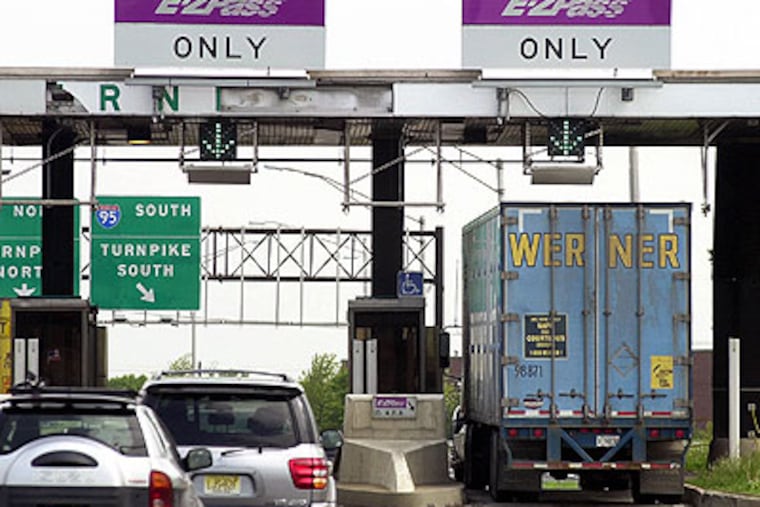With NJ Turnpike change, E-ZPass disparities grow
Although E-ZPass transponders look alike, they can take their toll on motorists' bank accounts in very different ways. A confounding array of 24 toll-road and bridge agencies in 14 states have their own rules, charges, and discounts, even though they all operate under the umbrella of "E-ZPass."

Although E-ZPass transponders look alike, they can take their toll on motorists' bank accounts in very different ways.
A confounding array of 24 toll-road and bridge agencies in 14 states have their own rules, charges, and discounts, even though they all operate under the umbrella of "E-ZPass."
And the disparities will increase on Friday.
That's when the New Jersey Turnpike Authority will abolish discounts for drivers who don't get their E-ZPass devices through the New Jersey E-ZPass system. Friday is also the day that frequent commuters will lose their $6-a-month E-ZPass discounts as tolls rise on the four bridges (Ben Franklin, Walt Whitman, Betsy Ross, and Commodore Barry) operated by the Delaware River Port Authority.
Consider the confusion:
A driver who maintains his E-ZPass account with Pennsylvania pays only $6 a year, compared with $18 for a driver who maintains an account with New Jersey, but the Pennsylvania driver isn't eligible for senior-citizen or "green" vehicle discounts on Delaware River bridges or, starting Friday, any E-ZPass discounts on the New Jersey Turnpike or Garden State Parkway. (All E-ZPass holders enjoy full discounts on the Pennsylvania Turnpike.)
A South Jersey driver who gets a 25 percent E-ZPass discount on the New Jersey Turnpike or Garden State Parkway won't get a 25 percent discount on the MTA's bridges and tunnels in New York City, such as the Verrazano Narrows Bridge and the Brooklyn-Battery Tunnel.
A North Jersey driver who gets an E-ZPass discount on the tunnels and bridges operated by the Port Authority of New York and New Jersey (such as the George Washington Bridge and the Lincoln Tunnel) won't get the E-ZPass discount on the New Jersey Turnpike or Garden State Parkway.
That's not fair, says AAA Mid-Atlantic.
The motorists' organization says the latest shift - the Turnpike Authority's elimination of out-of-area discounts - may seem like "a small move to raise $16 million for turnpike maintenance, [but] it underscores a much more distressing picture of fixing budget shortfalls on the backs of only certain motorists."
"All E-ZPass motorists should be treated equally and pay the same rate, regardless of which tolling agency issued the device," said Jim Lardear, spokesman for AAA.
"E-ZPass systems are an important way to reduce congestion, increase safety, and speed the flow of traffic. Users largely view it as a convenience tax for not having to sit in long tollbooth lines, so they are not really paying attention to the fact that they are being nickeled, dimed, and dollared to death" by various tolling agencies, Lardear said.
Treating all drivers equally would undermine the different goals of the 24 tolling agencies, who see E-ZPass as a way to share compatible technology, not necessarily compatible charges, said P.J. Wilkins, executive director of the E-ZPass Interagency Group, made up of the 24 toll agencies and based in Wilmington.
With 21 million transponders in use, accounting for 70 percent of the toll transactions in their states, E-ZPass dominates electronic tolling in the United States. And it is expanding beyond the Northeast and Midwest: By year's end, North Carolina and Florida are likely to have E-ZPass agreements.
But E-ZPass is like an octopus without a head - there are lots of arms, but no central mechanism that controls what those arms do.
"There's a misconception that there's an E-ZPass Corp. or E-ZPass Co.," said Wilkins. "It's not a company. It's not anything. It's an organization of tolling agencies."
The tolling agencies contract separately with companies to provide the technology, collect the money, and dun the violators.
The New Jersey Turnpike Authority, for example, pays $72 million a year to Affiliated Computer Services of Dallas for that "back office" work, out of about $660 million collected annually in electronic tolls. The Delaware River Port Authority pays about $6 million annually to ACS for its electronic toll collection, out of about $170 million collected annually in electronic tolls.
"Each agency is its own, with its own governance and its own procedures," said Wilkins. "There are financial and political realities in each state. We don't get involved in that."
Indeed, states may be tempted to retaliate against one another for charging out-of-state drivers more. The installation of electronic tolling in 2007 on the Indiana Toll Road led to a border feud with Illinois over toll discounts.
When the private Indiana toll-road operator said it would not grant Illinois I-Pass users the same 40 percent discount that the Illinois Tollway was set to grant Indiana I-Zoom users on its toll roads, the Illinois agency threatened to abolish all toll discounts for Indiana motorists.
Eventually, the Indiana government agreed to subsidize the discount for Illinois users, just as it does for Indiana users on the Indiana Toll Road. Both states are part of the E-ZPass group.
New technology in electronic toll readers is likely to allow E-ZPass to expand into states that now have their own systems, such as Florida, Texas, and California.
For the first time since the E-ZPass system began with an agreement between New Jersey and New York in 1994, the E-ZPass Group is soliciting proposals for a new electronic toll-collection system. The upgraded system will have to be compatible with existing systems in E-ZPass states, but also may have the ability to read one or two additional electronic languages, such as those used in Florida or Texas.
A contract for the upgraded system is expected to be awarded this year, Wilkins said.